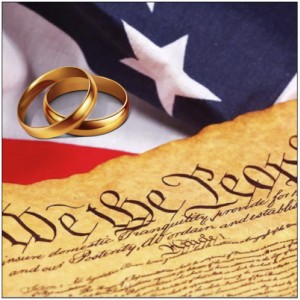Our President Brian Brown interviewed by NPR as part of a segment about the endgame for the marriage debate:
... Voters in Minnesota and North Carolina will consider a constitutional ban on same-sex marriage, while lawmakers in New Hampshire — a state where same-sex marriage has been legal for two years now — are considering a repeal.
A game-changer could come in the form of a couple of decisions from the U.S. Supreme Court, which may soon rule on California's Proposition 8 ban on same-sex marriage and on a challenge to the federal Defense of Marriage Act, which binds government to only recognize marriages between a man and a woman.
Brian Brown of the National Organization for Marriage says what states do now could influence the court's decisions.
"Given that we have a Roe v. Wade-type decision, the state fights become even more important because some of the justices don't like to have the law be too far ahead of where the public is," Brown says.
But even a Supreme Court decision is unlikely to end the debate. If the justices find same-sex marriage bans to be unconstitutional, opponents say they'll just redouble their efforts to amend the U.S. Constitution.

 With the state primaries underway, it is more important than ever that Republican voters know this: When it comes to marriage, Ron Paul is no conservative. Never mind, for the moment, that in his nearly three-decade-long congressional career Paul has written little of legislative consequence, or that a good deal of the Paul platform could only be accomplished with serious, game-changing amendments to the Constitution. Purely from a conservative values standpoint, a Ron Paul presidency would spell disaster for marriage in the United States.
With the state primaries underway, it is more important than ever that Republican voters know this: When it comes to marriage, Ron Paul is no conservative. Never mind, for the moment, that in his nearly three-decade-long congressional career Paul has written little of legislative consequence, or that a good deal of the Paul platform could only be accomplished with serious, game-changing amendments to the Constitution. Purely from a conservative values standpoint, a Ron Paul presidency would spell disaster for marriage in the United States. Our nation’s framers must be rolling over in their graves at the radical conclusion that the Constitution they wrote contained a right to gay marriage, yet Paul either lacks the courage of his supposedly strong convictions to correct this grievous judicial error, or he is gunning for the presidency at the cost of traditional values — you know, those pesky things most Americans still hold. Neither prospect is a good one.
Our nation’s framers must be rolling over in their graves at the radical conclusion that the Constitution they wrote contained a right to gay marriage, yet Paul either lacks the courage of his supposedly strong convictions to correct this grievous judicial error, or he is gunning for the presidency at the cost of traditional values — you know, those pesky things most Americans still hold. Neither prospect is a good one.





